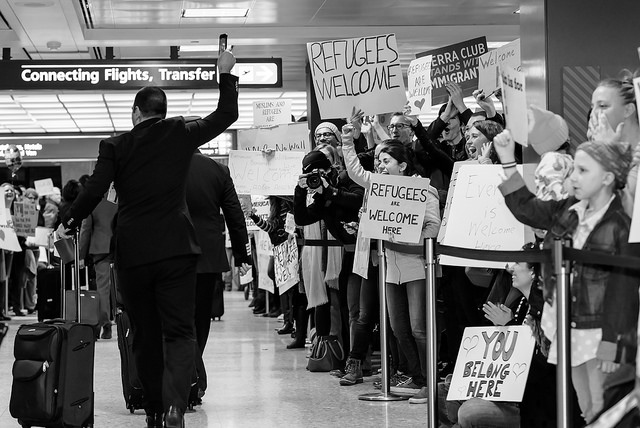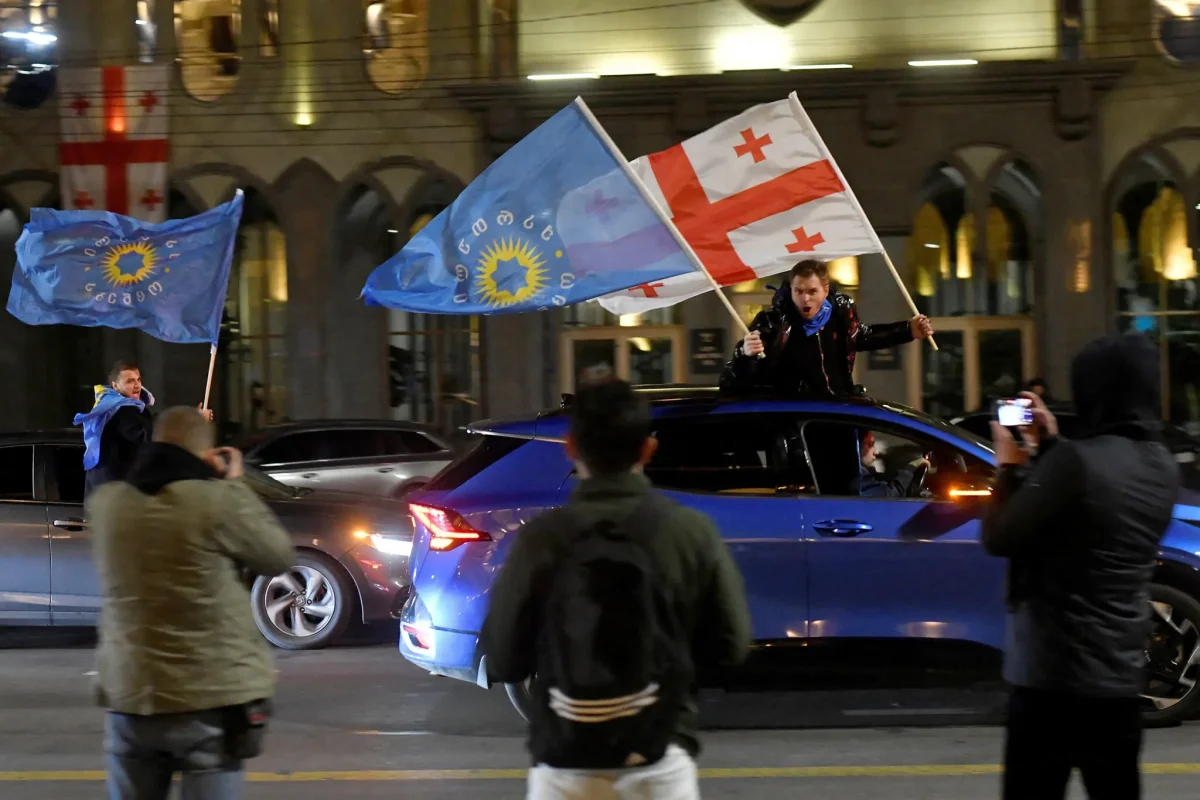With Donald trump’s recently issued executive order restricting refugees from Sudan, Syria, Iraq, Somalia, Ira, Libya, and Yemen, it is important to understand how the U.S.––and other countries, acquire refugees. While the international community expressed outrage at the ban, the US administration has defended what it perceives as a measure to protect national security. Donald Trump, in one of his notorious Twitter outbursts, has even said, “Our country needs strong borders and extreme vetting, NOW. Look what is happening all over Europe and, indeed, the world – a horrible mess.”
But Is Europe truly a mess? And is the US really in need of a better refugee policy?
Let’s take a look at the facts:
Geoff Livingston, “Refugees Welcome” Photo from Dulles International Airport (VA) Muslim Ban Protest
According to the office of the United Nations High Commissioner for Refugees (UNHCR), a refugee is “someone who has been forced to flee his or her country because of persecution, war, or violence. A refugee has a well-founded fear of persecution for reasons of race, religion, nationality, political opinion or membership in a particular social group.” In contrast to asylum seekers, which are merely seeking asylum in another country, refugees, in the sense affecting the US, are approved by the U.N. and American agencies in a rigorous process which lets them enter the country and be resettled.
Refugee camp on the Libyan-Tunisian Border (European Commision)
Refugees are first determined by the United nations in a process undertaken at UNHCR offices or camps, whereupon they may be considered for resettlement in one of the 28 approved countries worldwide– including the US. Criteria include demonstration of need, capacity to adapt or work in host countries, and personal traits, afterwhich they are registered for resettlement and their future becomes in the hands of international governments.
Then, in the US, they are interviewed by the State Department, given multiple background checks, and registered by fingerprint and photo three times. The refugees are interviewed by the Bureau of Immigration and Department of Homeland Security before even being considered eligible, then are screened for disease before being checked before and after their flight to the country. They also experience cultural orientation and are paired with resettlement agencies, resulting in closer monitoring and more effective integration, a strong prevention of later problems like terrorism.
UK protesters defend refugees
Not only is the US system extensive, but it is also the strongest in the world. Few countries have the benefit of an ocean to separate them from the largest refugee flows. In Europe and the nations closest to the conflict zones, the existing borders do not stop asylum seekers from entering the countries.
In contrast to the Mediterranean, which is easy to cross, the US’s border with the Atlantic acts as a natural shield, blocking flows of refugees and letting it admit most of the migrants it accepts by plane. This means Europe is virtually open to anyone entering and cannot easily classify “refugees” from unstable countries in the way the US does, making it far more vulnerable to refugee crises. Trump himself criticised Europe’s policies while referring to Belgium, calling Brussels an “Islamist hellhole” (Trump Warned Brussels was an Islamist “Hellhole”).
Thus, the governments of many EU nations and countries like Turkey and Jordan are building fences to further restrict access, a process which does little to stop the thousands of refugees entering the states every month.
European countries, which do not have the opportunity to vett refugees as the US does, are feeling the effects of unrestricted migrants. Ship patrols in the Mediterranean and border fences cost a lot of money with little benefit, while refugees and the welfare needed to support them are a significant drain on national resources, with the European Union’s border agency planning a budget of €322m for 2020 (Refugee crisis: EU agrees to set up new border and coast guard force).
Refugees have also formed shantytowns near major cities like Calais and have been accused of not adopting regional culture, with Muslim migrants particularly vulnerable. The most significant issue with the flow of migrants (and not refugees) is of course the jihadism associated with them as, though only a minuscule fraction of refugees become jihadis, the publicity raised by several attacks in the past few years by Middle-Eastern migrants has led to a hardening of attitudes against open borders in general, a factor which has played well with nationalist parties across the continent seeking to keep out the “terrorists.”
Donald Trump, the present Republican leader of the United States, has fallen steadily with far right leaders such as France’s Marine le Pen, a candidate in the country’s election this year, and has met with less radical figures like Theresa May of the UK.
It can be said that their concerns are similar, but Trump, and all in the US must realise the important geographical and societal differences between America and Europe in the context of refugees.
Not only can we afford to control the flow of refugees far more securely than in Europe, but our current system for doing so is one of the strongest in existence, securely vetting, bringing in, and integrating refugees into society. Concerns about jihadism, the “invasion” of migrants, or the inability of these to adopt American values are unfounded, and we should consider our situation far more in making our policies than Trump has done so far.
Sources:
http://www.infowars.com/trump-warned-brussels-was-an-islamist-hellhole/
http://www.politico.com/magazine/story/2017/01/i-went-through-americas-extreme-vetting-214703
http://www.unrefugees.org/what-is-a-refugee/

































































